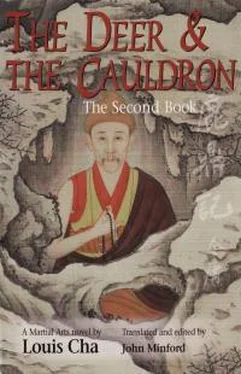OBOI, Lord (died 1669) This Imperial Guardian and Former Regent was one of Dorgon’s trusted men. He was elevated to the rank of Duke in 1656 and at the death of the Emperor Shun Zhi (1661) he was one of the Four Regents for the boy Emperor Kang Xi (with Soni, father of Songgotu; Ebilun; and Suksaha). He is arrested and put to death in the First Book.
OBSCURUS, Father Taoist Triad. Orphaned son of a frontier fur’trader shot dead by the Russians.
ORCHID SCENT One of Feng Xifan’s concubines.
PEERLESS CONSORT, the Chen Yuanyuan; once a beautiful consort of the last Ming Emperor, Chong Zhen, she subsequently passed through the hands of Bash’em Li (the rebel Li Zicheng), and then Satrap Wu, who was totally infatuated with her. When the Third Book begins, she is living outside Kunming in a hermitage, having been obliged to make way for the Satrap’s principal wife.
PENGCUN (died 1701) Manchu general who, together with He You and Lin Xingzhu, played an important part in the military campaign leading up to the Treaty of Nerchinsk.
PETER the First (later the Great) see Sophia, Princess
POTLUCK ISLAND Small island ten miles west of Snake Island, so named by Trinket, who uses it as his base during the campaign
QLOSSARY OF PEOPLE AND PLACES
XXVII
against the Mystic Dragon Sect. Later he settles on the island with his seven wives. PRINCE ZHENG see Zheng Jing SIR ZHENG see Zheng Keshuang QIAN, Butcher Triad, pork’butcher to the Palace. RED FIRE LODGE Triad Lodge of Guizhou Province. ROOTLESS, the Taoist Red Dragon Marshal; senior member of the Mystic Dragon Sect. SABSU (died c.1700) Manchu military official, who played an important part in the negotiations leading to the Treaty of Nerchinsk. SANGGE Chinese name for sDe’srid Sangs’rya’rgya’mtsho, Tibetan Grand Lama, formidable and somewhat sinister exponent of Tantric kungfu. Historically, Sangge was the Tepa, or Temporal Ruler, of Tibet, and seized absolute power after the death of the Fifth Dalai Lama in 1682, allying himself with Galdan. SCHALL, Adam von (1591’1666) One of the great Jesuits of the China Mission. Full name, John Adam Schall von Bell. Chinese name, Tang Ruowang. German Jesuit priest (by this time elderly), skilled in many technical fields, especially astronomy, who was greatly admired and trusted by Kang Xi’s father, the Shun Zhi Emperor. After Shun Zhi’s ‘death’ in 1661, Schall was accused of high treason, but his death sentence (to be carried out by Lingering Death, or the Slow Process) was commuted to house arrest, probably as the result of the pleading of Shun Zhi’s mother. (Our novelist takes certain liberties with historical fact, since it is highly improbable that Kang Xi, aged seven at the time, had anything to do with Schall’s survival.) Before serving the Manchus, Schall had served the last Ming Emperor, and even at one point offered his services to the bandit’leader Li Zicheng (see Bash’em), when Li had taken Peking and seemed set to become the next ruler of China. XXVIII
SHANG KEXI (died 1676) Chinese Bannerman and general (his defection to the Manchus dated from 1633); Satrap of Guangdong Province.
SHANG ZHIXIN (died 1680) Son of Shang Kexi, whom he succeeded as overlord of Guangdong, when his father was old and sick. In 1676, he threw his father into prison for refusing to turn against the Manchus, and personally joined Satrap Wu’s rebellion. Known to have been a cruel, licentious individual, he had a habit of having his personal enemies torn apart by hunting dogs. He was executed by Lingering Death.
SHEN, Old Elderly adept of the Mount Hua School, Shifu of Old Gui. A legendary figure greatly respected on River and Lake. He is chosen, in the Second Book, as President of the League for the Eradication of Traitors, a Resistance United Front.
SHI KEFA (died 1645) Ming Loyalist general, in command of Yangzhou in early 1645 when the city was besieged by the Manchu army under Dodo. After a failed attempt at suicide, he was captured by Manchu soldiers and put to death. In the legendary version of his death made popular by Kong Shangren’s 1699 play The Peach Blossom Fan (from which Beggar Wu sings a famous aria in Chapter 21), he is successful in drowning himself. Historically, it was not Kang Xi, but Kang Xi’s grandson, the Emperor Qian Long, who erected a temple in memory of Shi Kefa, in 1768.
SHI LANG (1621’1696) A former officer in the service of Coxinga’s father, Zheng Zhilong, who fell into disfavour with Coxinga’s consort, Lady Dong. He went over to the Manchus in 1650, was made an admiral in the Imperial navy, and defeated Coxinga at sea. While in Taiwan he had been one of the teachers of Zheng Keshuang. Kang Xi wrote of him’ ‘Shi Lang captured Taiwan speedily and proved a loyal official. Even if he was uneducated and arrogant, he made up for it by his rough and ready military abilities.’ (Spence, Emperor of China, p.35)
SHUN ZHI, Emperor (1638’1661’) The Hermit Emperor, often referred to as the Old Emperor (even though he is in fact barely forty years old), and sometimes the ex’Emperor. Shun Zhi was the
QLOSSARY OF PEOPLE AND PLACES
XXIX
reign title (the words mean literally ‘obedience and rule’) of Fulin, first Emperor of the Manchu dynasty, the ninth son of Abahai. He was known to have been deeply interested in Zen Buddhism, and it was widely believed that after the death of his favourite consort, the beautiful Empress Donggo, in the autumn of 1661, the young Emperor, ‘pining for his lost mistress and weary of the dull routine of statecraft, voluntarily handed over the government to four of his Ministers and retired to the contemplative life’ (Backhouse and Bland, Annals and Memoirs of the Court of Peking [London, 1914], p.235). As one contemporary poet wrote, ‘He threw away the Empire as one who casts away a worn’out shoe. Following the example of the Lord Buddha, he preferred to seek the mystic solitudes.’ This is the legend that lies behind the plot of Deer. The more conventional version of Shun Zhi’s death is that he died of smallpox. In the Second Book, he has appeared in the guise of Brother Wayward, in retreat in the hermitage behind the Pure Coolness Monastery. His Zen Master is the Venerable Yulin. SITU BOLEI Officer in Wu Sangui’s army who, in disgust at Wu’s collaboration with the Manchus, withdrew with some 30,000 of his men to the Wangwu Mountains (on the borders of Henan and southern Shanxi Provinces) and formed the resistance band known as the Wang Wu Clan, with its own distinctive style of kungfu. His son, Situ He, commanded the Wang Wu detachment that ran into Colonel Wishy’Washy’s (alias, Trinket’s) regiment en route to Shaolin in the Second Book. SITU HE Son of Situ Bolei. SNAKE ISLAND Snake’infested island in the Gulf of Bohai, lair of the Mystic Dragon Sect. SONGGOTU (died 1703) This immensely rich and powerful Manchu statesman of the Heseri clan, third son of the elderly Regent Soni, becomes Trinket’s ‘adopted brother’ and closest friend among the upper ranks of Manchu officialdom. SOPHIA, Princess Russian Regent, and Trinket’s lover. She was the sister of Tsar Theodore of Russia (eldest son of Tsar Alexius Mikhailovich, who had been the second Tsar of the Romanov dynasty, and reigned 1645’1676). Historically, Theodore died in 1682, and eventually his two surviving brothers, Ivan (Alexius’ second son, almost an imbecile) and Peter (the third son, born in 1672 to Alexius’ second wife, Natalia Naruishkina) were made conjoint Tsars, with their sister, the ‘ambitious and energetic’ Princess Sophia Alexeyevna, as Regent. She continued to rule autocratically as Regent until 1689, when Peter and his maternal relations had her put in a convent. Peter ruled (he was Peter the Great) until 1725.
SPAFARII In a note to Chapter 48 of the Chinese original of Deer (p. 2019), the author refers to a certain N. G. Spafarii. This Spafarii is Nikolaie Milescu’Spatarul, sometimes referred to as Spathar’Milescu, a Rumanian scholar in the Russian service, who in an embassy to China in May 1675 did in fact request that expert Chinese bridge’builders should be sent westwards to teach their methods to the Russians. (In Chapter 27 of the English translation of the Third Book, there is much talk from Vobolsky of the possibility of the Chinese building stone bridges for the Russians, though Cha’s learned reference to Spafarii has not been translated.) The great historian of Chinese science and technology, Joseph Needham, says in one of his inimitable footnotes that this remarkable fact was brought to his attention by H.E. Sardar K. M. Panikkar. Milescu’Spatarul (or whatever his name was) wrote a long book about all this in Russian in 1677, which was finally translated into Rumanian and published in Bucarest in 1956. All this is narrated in English by J. F. Baddeley, who gives his translation of Milescu, in Russia, Mongolia, China’ Being some Record of the Relations between them from the beginning of the 17th century to the Death of the Tsar Alexei Mikhailovich [d. 1676], London, 1919. See Needham, Science and Civilisation in China, IV’3, p. 149, note b.
Читать дальше












